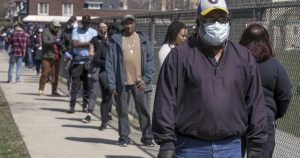NEW ORLEANS — Gretchen Romero says there’s no conceivable way for her to protect herself from contracting coronavirus.
Romero, 27, a Cuban migrant who’s been held in custody for eight months since requesting asylum in the U.S., said there’s no room inside her dormitory at the South Louisiana ICE Processing Center to walk, eat or sleep while practicing social distancing. She said guards come in and out of their dorm without wearing masks or gloves. More than 70 detainees in the dorm share five bars of soap, and she says no additional disinfectant or hand sanitizer has been provided at the facility where some detainees have already been isolated over fears of coronavirus.
Romero says it’s been horrifying to see such indifference inside the facility near Baton Rouge while the world outside is quarantining, social distancing, sewing masks and sanitizing their surroundings every chance they get.
“It’s like the world hasn’t changed and everything has stayed the same,” inside the detention center, Romero said. “We are terrified of dying. If people who have the ability to go to the doctor are dying, what’s going to happen to us in here?”
Attorney General William Barr has ordered the release of some medically vulnerable inmates from federal prisons and sheriffs have released thousands of jail inmates to minimize the risk of COVID-19 outbreaks. Yet there has been no similar effort made by Immigration and Customs Enforcement (ICE), which is currently holding more than 34,000 detainees, the majority of which — 60 percent — have no criminal record and are only being detained over a civil immigration violation.
The agency has released 160 detainees in recent weeks, but that hasn’t been nearly enough for detainees, politicians, doctors and human rights groups who have been pleading with the Trump administration to, at the very least, release detainees with poor health conditions. With little response coming from ICE, the groups have filed a wave of lawsuits around the country that have resulted in judges ordering the release of dozens of more detainees from California to Massachusetts to New Jersey.
When U.S. District Judge John Jones ordered ICE to release 11 chronically-ill detainees from a Pennsylvania detention center last week, he wrote that he issued the order because he could not be party to the “unconscionable and barbaric” possibility of those detainees contracting coronavirus.
ICE facilities “are plainly not equipped to protect Petitioners from a potentially fatal exposure to COVID-19,” wrote Jones, who ordered an additional 22 ICE detainees be freed on Tuesday. “If we are to remain the civilized society we hold ourselves out to be, it would be heartless and inhumane not to recognize Petitioners’ plight. And so we will act.”
Get daily coronavirus updates in your inbox: Sign up for our newsletter now.
One of the biggest challenges facing detainees is that they simply don’t know the magnitude of the spread of coronavirus inside ICE facilities.
The agency says 30 detainees and ICE personnel have tested positive for coronavirus in 16 different ICE facilities in 10 states as of Tuesday. But ICE officials have disclosed little information about its testing procedures — they will not say how many tests have been administered or what facilities are testing people, stating only that detention centers are following testing guidelines from the Centers for Disease Control and Prevention.
That makes it impossible to know how rapidly the virus is spreading inside ICE detention centers. In one case, a federal lawsuit forced the government to acknowledge that it had not tested any ICE detainees inside the Howard County Detention Center in Jessup, Maryland, has no test kits at the facility, and has “no plans to conduct testing,” according to a ruling issued by U.S. District Judge Theodore Chuang last week ordering ICE to begin testing at the detention center.
ICE data on coronavirus cases is also missing a large pool of people — the thousands of private contractors who work as wardens, administrators, guards, doctors, nurses, janitors and cooks inside ICE detention centers. ICE only owns and operates five of the more than 200 facilities that house ICE detainees around the country, the rest of the work being done by private prison companies and local jails.
That means ICE’s total case count does not include two guards working at the Krome Service Processing Center outside of Miami, Florida, who tested positive for coronavirus this week. An ICE official confirmed their positive tests.
ICE’s count is also missing two nurses and one guard who have died over the past week because of coronavirus complications at the Hudson County Correctional Center in Kearney, New Jersey, since they worked for the county or a private healthcare company working there under contract. The facility holds nearly 300 ICE detainees.
That lack of testing and transparency has prompted lawyers to file lawsuits to win the freedom of the most at-risk detainees, according to Eunice Cho, a senior staff attorney at the ACLU who is coordinating the more than a dozen lawsuits the organization has launched in recent weeks.
“We are fully aware of the magnitude of this problem and are deeply concerned about the health and welfare of all the detainees currently locked up in these facilities,” Cho said.
Some lawsuits could lead to the release of thousands of unaccompanied minors in the custody of the Department of Health and Human Services and adult migrants held by ICE.
U.S. District Judge Dolly Gee in California is considering a request to fast-track the release of nearly 7,000 thousand unaccompanied minors after HHS said four children in its custody in New York tested positive for coronavirus, as well as eight staff, contractors or foster parents in New York, Washington and Texas.
And U.S. District Judge James Boasberg of Washington, D.C., is considering a request to release about 1,350 members of migrant families who are detained at three family detention centers in Pennsylvania and Texas.
Beyond those lawsuits, it’s proven challenging for attorneys to hear from more detainees, given ICE’s new guidelines requiring all attorneys to bring their own personal protective equipment when visiting clients in detention.
Jessica Schneider is the director of the detention program for Americans for Immigrant Justice in Miami. She said her attorneys would normally be in the region’s ICE detention centers at least once a week meeting with detainees who enter the facility and providing legal assistance to them, but her organization doesn’t have enough masks and gloves to send their attorneys into the facilities.
Making matters worse, the largest ICE detention facilities in Florida don’t have secure video-conferencing capabilities that would allow lawyers and clients to speak confidentially about their cases. That’s left Schneider forced to have conversations with her clients through unsecure phone calls or video chats on tablets provided to detainees as guards and other detainees walk past within earshot.
“We have always shied away from using those tablets because they’re not confidential. But at this point, we feel that finding out what the facts are on the ground and communicating with people is trumping our ability to engage in confidential communications,” she said. “And that shouldn’t be a decision an attorney has to make. It’s 2020. If we can all have Zoom calls and FaceTime, setting up legal calls (should be possible).”
At the Mesa Verde ICE Processing Center in Bakersfield, California, Charles Joseph said he has access to soap and water to wash his hands, but doesn’t have access to cleaning supplies to disinfect the hard surfaces in his dormitory. Joseph, 34, who was picked up by ICE after serving a prison term for armed robbery, said he’s trying to stay safe at Mesa Verde, but said officials at the 400-bed facility are making it impossible.
“At no time an I ever six feet away from another person,” said Joseph, who is from Fiji. “We are sitting ducks in a petri dish. Once it comes in here, everybody is going to catch it.”
Asked about those concerns, a spokesperson for GEO Group, a private prison operator that manages Mesa Verde and 21 other ICE facilities around the country, rejected Joseph’s “unfounded allegations” and claimed they were instigated by “outside groups with political agendas.”
In a statement last month, the company said it has experience implementing “best practices for the prevention, assessment, and management of infectious diseases.” In response to coronavirus, the company said it has educated employees about preventative measures, advised employees to stay home if they have flu-like symptoms, enacted quarantine and testing policies for employees who may have come in contact with someone who tested positive for the virus, and deployed specialized sanitation teams to sterilize high-contact areas of its facilities.
Similarly, ICE says it has taken appropriate actions to mitigate the spread of coronavirus throughout its detention network. The agency has said it is abiding by CDC guidelines and “keeping everyone safe.”
On Tuesday, the agency for the first time said it was reviewing cases to determine if the most vulnerable detainees can be released from custody given the “unprecedented nature of COVID-19.”The agency said it was reviewing 600 detainees deemed “vulnerable.”
“Utilizing CDC guidance along with the advice of medical professionals, ICE may place individuals in a number of alternatives to detention options,” the ICE statement read. “Decisions to release individuals in ICE custody occur every day on a case-by-case basis.”
Stay connected, even when we’re all apart: Join our Coronavirus Watch Facebook group.
Yet detainees, and an increasing number of judges, say the agency has fallen short.
“The risk of contracting COVID-19 in tightly-confined spaces, especially jails, is now exceedingly obvious,” wrote U.S. District Judge Analisa Torres in a ruling ordering the release of 10 ICE detainees from detention centers in New Jersey last month.
Ricky Williamson, 31, a detainee at Mesa Verde, said he told a judge in immigration court last week that he was dropping his case to remain in the U.S. because he would rather be deported to his native United Kingdom then wait for the virus to start circulating through the detention center. While the U.K. is going through its own coronavirus outbreak, he said he would prefer the freedom to wear gloves and a mask than stay inside an ICE facility.
“It was the hardest decision of my life,” said Williamson. “At least if I’m free, I can do my own stuff to prevent getting it.”
Martin Alvarez Garcia, 28, made a similar decision last week. He has had a cough and sore throat for more than two weeks, he said, but doctors at the facility have denied his request for a COVID-19 test because he doesn’t have a fever. So last week, he waived his right to appeal his deportation order.
“I would honestly rather sign and go back to my country then risk myself getting infected,” he said. “I don’t feel safe anywhere in Mexico, but I have no choice.”
Contributing: Monsy Alvarado, The (New Jersey) Record.
















